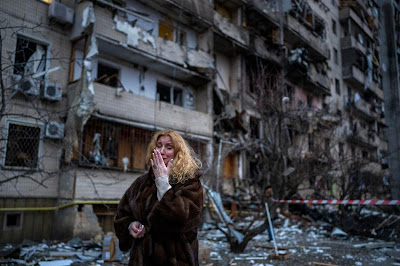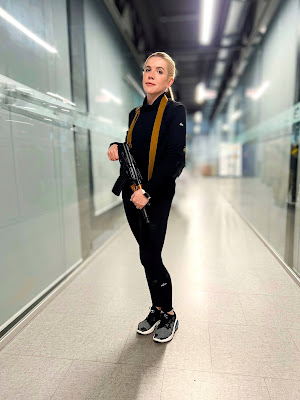 |
| Natali Sevriukova reacts next to her house following a rocket attack on Kyiv on Friday, February 25, 2022. —CNN |
Today's News . . . Today's Poem
The New Verse News
presents politically progressive poetry on current events and topical issues.
Guidelines
Submission Guidelines: Send unpublished poems in the body of an email (NO ATTACHMENTS) to nvneditor[at]gmail.com. No simultaneous submissions. Use "Verse News Submission" as the subject line. Send a brief bio. No payment. Authors retain all rights after 1st-time appearance here. Scroll down the right sidebar for the fine print.
Monday, February 28, 2022
SPRING
DOOMED
ELEGY FOR LVIV AND STANISLAWÓW
 |
| As Russia’s vicious attack on Ukraine continues, the western “safe haven” town of Lviv (top photo) is bracing itself to join the theatre of war. “We expect there could be an attack,” says Olga Myrovych, 34, head of the Lviv Media Forum. “We are far from Putin’s border, but this will distract the efforts of the Ukrainian army.” Lviv is a central European jewel, an exceptionally elegant town with a long history of culture and tragedy. —Institute for War & Peace Reporting, February 27, 2022. In the lower two photos, Ivano-Frankivsk (formerly Stanislawów), a city located in Western Ukraine, had its airport, fuel, and lubricants depots destroyed by the Russian missile systems. The city, formerly Stanisławów, is almost 600km away from Kyiv. With the city airport bombed, the people of Ivano-Frankivsk are being evacuated to bomb shelters. —SAYS, February 26, 2022. |
Sunday, February 27, 2022
THE TURTLE GAME
THE OTHER NEW YORK
 |
| A view shows a petrol station, which bears the name of New York in Donetsk Region, Ukraine March 3, 2021. REUTERS/Gleb Garanich. See also Wikipedia. |
LOVE THAT CANNOT LIVE LONG ENOUGH
 |
| Fact Check by Reuters, February 25, 2022: Photos of explosions show Israeli-Palestinian conflict, not Ukraine. Social media users have mislabeled images of overnight explosions in urban areas, claiming they are from Ukraine amid the Russian invasion. However, the images show the Israeli-Palestinian conflict in the Gaza Strip and were taken in 2018 and 2021. One picture (above by MAHMUD HAMS/AFP via Getty Images) shows Israeli air strikes on Gaza in response to a barrage of rockets fired by the Islamist movement Hamas amid spiraling violence sparked by unrest at Jerusalem's Al-Aqsa Mosque compound. |
Saturday, February 26, 2022
PERSPECTIVE
“This is a relatively civilized” city, he says, referring to Kyiv, after saying it’s not like Iraq or Afghanistan. https://t.co/q6UEtwvzyZ
— Mehdi Hasan (@mehdirhasan) February 26, 2022
THE DAY BOMBING OF UKRAINE BEGAN, 2/24/22
by Julie Bolt
 |
| The old Kiev Restaurant on 7th Street in Greenwich Village; Allen Ginsberg and Quentin Crisp dining there. |
AFTER BOMBS DROP
A MOTHER FLEES
 |
| "Fire in the Snow" (1942); Gouache on paper by Marc Chagall. Collection: Amy and Eric Huck, Lewisberry, Pennsylvania |
Like a statuethat’s come alivejust in timeto jump downfrom her perchabove the altar,a mother flees.
No crownon her headto hold in placeher flaring hair,a mother flees.
No husbandin sight,the angels gonein disbelief,left with a sonto save,a mother flees.
FAMILY DEBATE OVER KIMCHI
Friday, February 25, 2022
90TH BIRTHDAY IN KYIV
 |
| In just four weeks in the summer of 1941 the German Wehrmacht wrought unprecedented destruction on four Soviet armies, conquering central Ukraine and killing or capturing three-quarters of a million men. This was the battle of Kyiv–one of the largest and most decisive battles of World War II and, for Hitler and Stalin, a battle of crucial importance. Hundreds of thousands of Soviet prisoners of war were taken in the aftermath of the battle of Kiev, but very few would survive German captivity. —Arthur Grimm, “Kiev 1941: Hitler's Battle for Supremacy in the East,” Semantic Scholar |
WINTER BREAK
POEM FOR A RUSSIAN SOLDIER
 |
| A dead Russian soldier in Kharkiv, Ukraine. Credit: Tyler Hicks, The New York Times. |
WHEN GOVERNOR ABBOTT DECRIES GENDER-TRANSITIONING AS CHILD ABUSE
Thursday, February 24, 2022
THE END OF HOPE
THE ARTIST
 |
Covered in red and blue graffiti, the toppled statue of British politician Edward Colston, who enslaved tens of thousands of people, stood in the city of Bristol, UK for more than 100 years before it was pulled down by angry protesters during a wave of Black Lives Matter protests across the country last summer—after the death of George Floyd at the hands of Minneapolis police. Demonstrators used rope to tug the statue from its stone plinth and their bare hands to roll it through the streets and into the murky waters of a nearby harbor as onlookers cheered. Others chanted “Black Lives Matter,” in solidarity with those across the Atlantic dealing with issues of police brutality, systemic racism and complex histories. —The Washington Post, June 4, 2121 |
Wednesday, February 23, 2022
WAITING FOR ARMAGEDDON
Explosions in Kyiv heard live on air https://t.co/JGLvh4k8tX
— HectorM (@JaguarVer) February 24, 2022
LAST RIGHTS
 |
| Nearly a quarter of Americans say it's sometimes OK to use violence against the government—and 1 in 10 Americans say violence is justified "right now." That's the finding of a new report by The COVID States Project, which asked 23,000 people across the country whether it is "ever justifiable to engage in violent protest against the government?" The report is one of several in recent months that find people more likely to contemplate violent protests than they had been in the past. Christian Davenport, a professor at the University of Michigan and a research professor at the Peace Research Institute Oslo, is… circumspect. While the numbers are "not especially surprising," Davenport said he's "not a fan of the use of polls exclusively" to determine a populace's potential for violence. "Individuals will say a great number of things on a poll," he said, "but never show up for anything." Photo: Trump supporters climb the west wall of the U.S. Capitol on Jan. 6, 2021. —NPR, January 31, 2022 |
WHEN FREEDOM'S SAKE IS MUCH THE SAME AS HEAVEN'S
 |
Tuesday, February 22, 2022
2022 WINTER OLYMPICS
 |
| Read: "What Uyghur Americans Want You to Know about the Olympic Games" from the United States Holocaust Memorial Museum |
Monday, February 21, 2022
EASTERN UKRAINE POEM
by Indran Amirthanayagam
for Ilya
The town is not amused. Bombs have been dropping
every ten minutes and thousands of women and children
have already fled, but Ilya's cousin on the Zoom call
keeps insisting on calm. What gives? I wish I could
shift the debate to my own little conflict, lobbing
poems into cyberspace and expecting the fallout
to give some clues about diction and meter, the finishing
couplet. Once again, my poem shifts to a discourse
about me and my proclivities.What about those family
members on the trains? What about the fellow trying
to pacify his cousin via Zoom? What about the soldier
on the border wrapped in an overcoat carrying a rifle?
Is he really able to fight in the modern theater against
the satellite-beamed remote killing device?
Indran Amirthanayagam's newest book is Ten Thousand Steps Against the Tyrant (BroadstoneBooks). Recently published is Blue Window (Ventana Azul), translated by Jennifer Rathbun.(Dialogos Books). In 2020, Indran produced a “world" record by publishing three new poetry books written in three languages: The Migrant States (Hanging Loose Press, New York), Sur l'île nostalgique (L’Harmattan, Paris) and Lírica a tiempo (Mesa Redonda, Lima). He writes in English, Spanish, French, Portuguese, Haitian Creole and has twenty poetry books as well as a music album Rankont Dout. He edits The Beltway Poetry Quarterly and helps curate Ablucionistas. He won the Paterson Prize and received fellowships from The Foundation for the Contemporary Arts, New York Foundation for the Arts, US/Mexico Fund For Culture, and the MacDowell Colony. He hosts the Poetry Channel on YouTube.
INTIMIDATION AND BLACKMAIL FOR THE PURPOSE OF TAKING OVER THE WORLD
by Terese Coe
Watch for the multiple rows of replacement teeth,
the not-unfair comparison to sharks,
the antipathies that betray the territorial,
the sonar for the nascent dictatorial.
Terese Coe’s poems, prose, and translations appear in The New Verse News, Agenda, Alaska Quarterly Review, Cincinnati Review, The Classical Outlook, Cyphers, Hopkins Review, Metamorphoses, The Moth, New American Writing, New Scotland Writing, Ploughshares, Poetry, Poetry Review, The Stinging Fly, Stone Canoe, Threepenny Review, the TLS, and many other international publications. Her book Shot Silk was short-listed for the 2017 Poets Prize, and her poem “More” was heli-dropped across London in the 2012 Olympics Rain of Poems. Giorno Poetry Systems, West Chester Poetry Conference, Barnstone Translation Award, and others have awarded her prizes or honors and scholarships.
THE BALLAD OF THE WHITE HOUSE LAVATORY
Sunday, February 20, 2022
SOUL
Saturday, February 19, 2022
A SOLITARY MAN
 | |
| For the past 27 years, Dennis Wayne Hope (above) has been in a Texas prison cell that is somewhere between the size of an elevator and a compact parking space. For one hour, seven days per week, or two hours, five days per week, he is let out to exercise—alone—in another small enclosure. The only people he comes into contact with are the guards who strip search and handcuff him. The last personal phone call he had was in 2013 when his mother died. More than a quarter-century in isolation has led him to hallucinations, chronic pain and thoughts of suicide. Solitary confinement is a sanitized term for torture. Mr. Hope, 53, whose plight was described by the New York Times, has petitioned the Supreme Court to hear his case on the grounds that his prolonged isolation is a violation of the Eighth Amendment’s bar against cruel and unusual punishment. Lower courts denied Mr. Hope’s petition and court observers are skeptical the Supreme Court will take up his case. So sure are Texas officials that the court, with its conservative majority, won’t agree to hear the case that they waived their right to respond to Mr. Hope’s petition for a writ of certiorari. —The Washington Post, February 16, 2022 |






